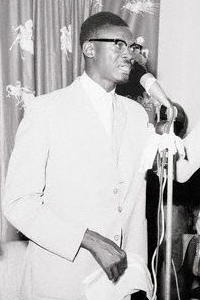Patrice Lumumba
First Prime Minister of the Democratic Republic of Congo (June - September 1960), b. 2 July 1925 (Onalua, Belgian Congo), d. January 1961 (Katanga, Congo)
 Patrice Lumumba was born in a village of the Kasai province of the Congo (today's Zaire). He received his early education in a Protestant mission school. He found work as a postal clerk in Léopoldville (today's Kinshasa) and moved on to Stanleyville (today's Kisangani) to become an accountant for the post office. At the same time he wrote essays and poems for the Congolese press.
Patrice Lumumba was born in a village of the Kasai province of the Congo (today's Zaire). He received his early education in a Protestant mission school. He found work as a postal clerk in Léopoldville (today's Kinshasa) and moved on to Stanleyville (today's Kisangani) to become an accountant for the post office. At the same time he wrote essays and poems for the Congolese press.
Lumumba's early interest in public affairs was a period of development. He joined the club of the "evoluées" (the "educated Africans"). He applied for and was admitted to full Belgian citizenship. By the time he had reached the age of 30 his outlook had become more African; in 1955 he became president of a trade union of government employees that was not affiliated to a Belgian trade union body but was a true Congolese trade union.
In 1956 the Minister of the Colonies invited Lumumba to join a study tour of Belgium. When he returned, he was arrested for embezzlement and convicted, after several reductions of the sentence, to 12 months prison and a fine.
On release from prison in 1958 Lumumba founded the Mouvement National Congolais (MNC, National Congolese Movement), the first national African political party of the Congo. The first All-African Peoples' Conference in Accra, Ghana, made him a member of the permanent organization set up at the Conference. Lumumba was now a politician with a clear nationalist vision and an All-African outlook of struggle for the liberation from colonialism.
The next two years were characterized by a rapid succession of events. In 1959 the colonial power announced a five-year plan of transition to independence. The MNC saw this as an attempt to groom and install puppet politicians before independence and announced a boycott of the local elections proposed by the plan. The Belgian government opted for open suppression, leading to a clash with 30 deaths in Stanleyville on 30 October 1959 and Lumumba's arrest.
When the MNC changed tactics and participated in the election it received a sweeping vote of confidence - in Stanleyville 9 out of 10 voters voted for the MNC. The Belgian government suggested an conference in Belgium to discuss the situation, but had to release Lumumba and allow him to participate in the meeting. The conference set 30 June 1960 as the date for independence, preceeded by general elections in May. The MNC emerged as by far the strongest political force, and against machinations of the colonial power and some Congolese allies Lumumba was asked to form a government. He presented his cabinet on 23 June and was sworn in as Prime Minister.
Lumumba's declared policy was one of "positive neutralism", defined as a return to African values, rejection of outside ideology (capitalist and communist) and control of the nation's wealth. This latter point was unacceptable to the old imperial powers, who controlled the profitable mining industry in the Congo's Katanga province. A few days after independence Katanga declared its secession from the Congo; Belgian troops, said to be needed for the protection of Belgian nationals, openly supported the secessionist regime of Moise Tchombe.
Lumumba appealed to the United Nations to restore Congo in its international borders and terminate the presence of Belgian troops, but to no avail. In an attempt to get government troops into Katanga he asked the Soviet Union for transport planes. Urged by western nations, President Kasavubu dismissed Lumumba, who declared the dismissal illegal; but a military coup by colonel Mobutu on 14 September made it impossible for Lumumba to exercise power, and he had to stay in Léopoldville under United Nations protection. When he tried to travel to Stanleyville, where he still had strong support, he was abducted by Kasavubu's military and handed over to Katanga on 17 January 1961. Some days later he was murdered by Katangan and Belgian secret police.
Lumumba was a determined nationalist with a great gift to inspire the people of Africa. His impromptu response to the condescending speech of the Belgian king at the independence ceremony will be remembered forever. When the king admonished the Congolese to be thankful for the gifts of civilization that Belgium was leaving behind, Lumumba's speech ignored the agenda of the carefully planned event and reminded evryone present of the endless suffering and exploitation during Belgium's colonial rule. Lumumba's death caused uproar in Africa, and even his enemies had to declare him a "national hero". Africa rightly regards him as one of her best sons.
In February 2002 the Belgian parliament officially apologized to Lumumba's family for Belgium's role in his death.
photo: GNU Free Documentation License (Wikipedia)
home
 Patrice Lumumba was born in a village of the Kasai province of the Congo (today's Zaire). He received his early education in a Protestant mission school. He found work as a postal clerk in Léopoldville (today's Kinshasa) and moved on to Stanleyville (today's Kisangani) to become an accountant for the post office. At the same time he wrote essays and poems for the Congolese press.
Patrice Lumumba was born in a village of the Kasai province of the Congo (today's Zaire). He received his early education in a Protestant mission school. He found work as a postal clerk in Léopoldville (today's Kinshasa) and moved on to Stanleyville (today's Kisangani) to become an accountant for the post office. At the same time he wrote essays and poems for the Congolese press.